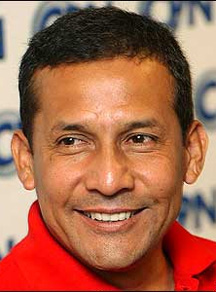LIMA, (Reuters) – Peru’s leftist President-elect Ollanta Humala has launched a “shock of confidence” to show investors he has shed his radical past and will prudently lead one of the world’s fastest-growing economies.

In a bold move, Humala, who once railed against foreign investors and Wall Street, said late on Sunday he will reappoint conservative central bank chief Julio Velarde for another five-year term. It was the clearest sign yet that Humala will govern as a moderate.
And another surprise may be in the works. There are strong indications Humala will pass over the left-leaning economists he relied on during the campaign and, instead, pick orthodox economist Luis Miguel Castilla to be finance minister.
Humala, who takes office July 28, is expected to name his cabinet tomorrow after weeks of delays. Hardliners and moderates in Humala’s Gana Peru party have jockeyed for power following his June 5 election victory.
A former World Bank official who has a doctorate from Johns Hopkins University in the United States, Castilla was vice finance minister until he resigned on Saturday.
Castilla served under three finance ministers associated with Peru’s free-market model, which Humala has criticized for leaving a third of Peruvians mired in poverty while prompting an overall surge in growth over the past two decades.
“It seems that Humala has decided to abandon the economics team that he had during the campaign, which is very positive,” said Jorge Gonzalez, a professor at Lima’s Universidad del Pacifico, where Velarde and Castilla are on the faculty.
“His team was full of people who had unorthodox, leftist views about how to manage economic policy and the country’s finances.”
Top members of Humala’s economics team, such as Felix Jimenez, a professor at Lima’s Catholic University, are opponents of “neoliberal” policies that have underpinned Peru’s successes and won it investment grade credit ratings.
Humala’s original campaign platform, which was authored by Jimenez, read like a flashback to the 1970s, when Marxist academics encouraged developing countries to turn inward, follow their own interventionist economic policies, and break their dependency on rich countries.
Kurt Burneo, a technocrat on Humala’s transition team, had been considered by many the frontrunner for the finance ministry post, but on Monday he appeared less optimistic about getting the job.
“Castilla is a qualified technocrat and it’s the president-elect’s decision,” Burneo told Reuters.
Left-wingers in Humala’s party said they were concerned that Castilla, who worked for departing President Alan Garcia, could get the key position.
“For me this is worrisome, because (Castilla) comes from the current administration and is part of the team that ran the policy of growth without social inclusion,” said Javier Diez Canseco, who will be a lawmaker in the next Congress.
But analysts on Wall Street said Castilla would be a good pick, and local financial markets surged on Monday as Humala tacked further toward the centre.
“Definitely Castilla, of the names mentioned, is one of the best,” said Alejandro Grisanti of Barclays in New York. “He is well-known and we think he is very technical.”
The business community had urged Humala since he won the election to generate a “shock of confidence” that would persuade them to proceed with billions of dollars in projects delayed because of political uncertainty.
CONCESSION TO THE RIGHT
“This is Humala’s concession to the right,” a Peruvian fund manager said of Velarde’s reappointment.
Humala had been expected to name Oscar Dancourt — an academic economist, member of his transition team, and a former central bank president — to take over at the central bank.
But Dancourt lacks Velarde’s gravitas on Wall Street and is not seen as a tough inflation hawk. Inflation is projected to be about 3 percent in 2011.
Velarde is a rare breed among central bankers, having successfully slayed hyperinflation in the 1990s and averted deflation during the most recent global economic crisis.
Humala announced he would retain Velarde just after a poll on Sunday showed his approval rating had sunk over the past few weeks to 41 percent from 70 percent and as some leading economic indicators took a turn for the worse.
Growth in private investment, which had surged 30 percent a year, slowed to 13 percent in the first five months of this year on worries Humala might roll back years of free-market reforms. The economy is now forecast to grow around 6 percent this year after expanding 9 percent last year.
In addition to the naming of a finance minister, investors are keen to see who will become prime minister and who will take over as mining minister in one of the world’s top minerals exporters, where $50 billion in mining and oil investments have been lined up for the next decade.
“We are going to build a cabinet of national conciliation, to give economic stability to the country,” Humala said on Sunday.
